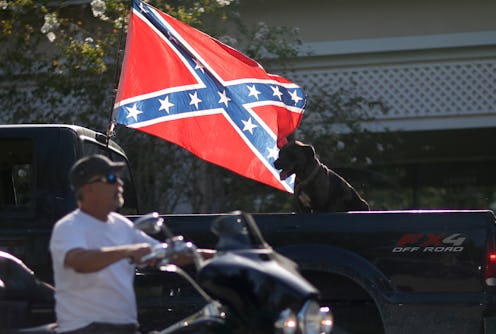
For the first time in a decade, the number of Confederate flag license plates in Tennessee has surged, hitting a record high. According to The Tennessean, data from the state's Department of Revenue revealed that there were 3,273 Sons of Confederate Veterans license plates active in the state by the end of the 2018 fiscal year.
It's a 72 percent increase, according to the publication, from 2015, when the subject of Confederate flags entered public debate — the same year a shooter opened fire on nine African-Americans at Mother Emanuel Church in Charleston, South Carolina. The state's Department of Revenue also noted that demand for such license plates was increasing.
According to the data provided to The Tennessean, the number of Sons of Confederate Veterans license plates slowly went up between 2016 and 2017. How does that play out on the roads of Tennessee? According to the Department of Revenue, there are 5.6 million registered plates in the state. This means that the number of Sons of Confederate Veterans license plates amounts to less than a tenth of the state's driving vehicle.
Still, such a number may be alarming. For many racial minorities, the presence of such a flag on active vehicles could create a culture of fear of racial hatred.
Why are Tennesseans increasingly buying such license plates? According to the head of the state's local Sons of Confederate Veterans' chapter, James Patterson, it is supposedly because of "all the anti-Confederate rhetoric that's been going on" regarding the subject of Confederate monuments in the country. In America's South, the number of Confederate statues is staggeringly high and perennially a subject of much contention calling for their removals.
"Every time that some of our history that we're so proud of has been attacked, people have gone out, and probably some members who had license plates but quit renewing have gone back and put them back on their vehicle," Patterson said. He told The Tennessean that he possesses the plate on four of his own vehicles.
As far as the revenue generated by the selling of these plates is concerned, the money goes to the Sons of Confederate Veterans — a non-profit organization for the male descendants of Confederate soldiers — in helping them sue the city of Memphis. For the fiscal year of 2018, the group received $57,700 in sales of the plates. The group sued Memphis in January for the removal of Confederate Nathan Bedford Forrest's statue. Forrest, it is imperative to mention, was also a grand wizard for the white supremacist Ku Klux Klan organization. Another portion of the revenue goes to the Tennessee Arts Commission and the Highway Fund.
Actual historians have issued strong words against the Confederate flag. People like Matthew Guterl, Africana and American studies professor at Brown Univeristy, told The Washington Post in 2015 that the flag is not a neutral symbol but a "defense of slavery and racial prejudice." He said, "Even to say that it’s about heritage not hate is to recognize that for many people it is inextricably about [racial] hate. You can’t filter out the racism and leave what’s pure and historical in the flag, because that purity doesn’t exist."
"Some things are so primitively stained or tarnished by history," Guterl said, "that that can never be set side. The flag is a perfect example."